- Home
- Ann Patchett
The Dutch House Page 8
The Dutch House Read online
Page 8
Mr. Brennan rode along in the ambulance, and when they got to the hospital, he called Mrs. Kennedy at my father’s office. Mrs. Kennedy called Maeve. Some kid came into my geometry class and handed a folded note to the teacher, who read it to himself and then told me to get my things and go to the principal’s office. No one comes into the middle of geometry and tells you to get your things because you’re going to be a starter at the next basketball game. When I went down the hall I had only one thought and it was for Maeve. I was so sick with fear it was all I could do to make myself walk. She had run out of insulin or the insulin wasn’t any good. Too much, not enough, either way it had killed her. Until that minute I never realized the extent to which I carried this fear with me everywhere, every minute of my life. I was the tallest boy in my class, and muscled up from basketball and construction. The principal’s office was a glass-fronted room that opened onto the lobby and when I saw Maeve standing at the desk with her back to me, her unmistakable hair in a braid trailing down her back, I made a sound, something high and sharp that seemed to have come up from my knees. She turned around, everybody turned around, but I didn’t care. I had asked God for one thing and God had given it to me—my sister wasn’t dead. Maeve was crying when she put her arms around me and I didn’t even ask her. Later she would say she assumed I knew because of the look on my face, but I had no idea. I didn’t know until we got in the car and she said we were going to the hospital and that our father was dead.
We made a terrible mistake but even now it’s hard for me to say exactly whose mistake it was. Mr. Brennan’s? Mrs. Kennedy’s? Maeve’s? My own? Mrs. Kennedy made it to the hospital before us and was waiting with Mr. Brennan when we arrived. Mr. Brennan told us what had happened. He told us that he didn’t know CPR. Hardly anyone knew CPR in those days. His wife was a nurse and she had told him he should take the class but he hadn’t done it. There was such pain on his face that Maeve hugged him and Mr. Brennan leaned against her shoulder and cried.
They had kept our father in a small room off to the side of the emergency room so that we wouldn’t have to go the morgue. He was in a regular hospital bed, his tie and jacket gone, his blue shirt unbuttoned at the neck and stained with blood. His mouth was open in a way that made it clear to me his mouth could not be closed. His bare white feet were sticking out from the bottom of the sheet. I couldn’t imagine where his shoes and socks had gone. I hadn’t seen my father’s feet in years, since whatever summer it was we had last gone to the lake. There was a terrible, bloodless cut on his forehead that had been crudely taped together. I didn’t touch him, but Maeve leaned over and kissed his forehead just beside the bandage, then kissed it again, her long braid falling across his neck. She didn’t seem to mind his open mouth but it was horrifying to me. She was so tender with him, and I found myself thinking that when he woke up I would tell him how good she was, how much she loved him. Or maybe I would tell him when I woke up. One of us was sleeping and I didn’t know which one of us it was.
The nurse gave us too much time alone with him, and then the doctor came into the room and explained the nature of the death. He told us that the heart attack had happened very fast and that there was nothing that could have been done to save him. “Chances are he was dead before he fell. Even if it had happened right here in the hospital,” he said, “chances are it wouldn’t have been any different.” This was before I knew that doctors could lie as a means of comfort. Without an autopsy, he was telling us nothing more than a likely story, but we clung to it without question. Maeve was given papers to sign and in return received his suit jacket and tie in a bag, along with a manila envelope containing his wallet, watch and wedding ring.
We were very young, and our father had died. To this day I don’t think we were responsible. We came in the kitchen door and Sandy and Jocelyn were there and we told them what had happened. The second they started to cry I knew what we had done. Sandy had her arms around me and I twisted to get away from her. I had to find Andrea. It had to be me finding Andrea, she could not find us there, but as soon as I’d had the thought she walked into the kitchen, into the mess of the four of us and our collective, exclusive grief. She had heard the howling. Jocelyn turned and put her arms around her employer, something I would guarantee she’d not done before or since. “Oh, Mrs. Smith,” was what she said.
The look of terror that came over Andrea then—that look has stayed with me all these years. Long after I could no longer see my father on his hospital bed, I could still see the fear on Andrea’s face. She took a step back from us.
“Where are my girls?” she whispered.
Maeve shook her head the smallest bit, because of course by then she realized it too. “They’re fine,” she said, her voice barely coming out of her mouth. “It’s Dad. We’ve lost Dad.”
There was the plastic bag of his clothes on the kitchen table, the evidence against us. Later we would tell ourselves that we were sure Mrs. Kennedy had called her, but nothing had happened to make us think that. The truth was we had come this far and had never given Andrea a thought. Our cruelty became the story: not our father’s death but how we had excluded her from it.
Had we done a better job would the outcome have been the same? Had Mr. Brennan called Andrea and not Mrs. Kennedy (but Mr. Brennan had never met Andrea, and had worked with Mrs. Kennedy for twenty years), had Mrs. Kennedy called Andrea and not Maeve (but Andrea was rude to Mrs. Kennedy on the phone every time she called our father at work, never saying one thing more than “Let me speak to my husband.” Mrs. Kennedy would never have called Andrea. She told me as much at the funeral). Had Maeve left Otterson’s and rushed to the Dutch House to tell Andrea instead of coming to the school to get me, or if we had left the school together and gone to pick her up, the three of us going to the hospital, where would we be now?
“Right here,” Maeve would say. “We didn’t make her who she is.”
But I was never sure.
Andrea’s hurt was her prize blue ribbon, and in return what I felt in those blinded days just after my father’s death was not the grief for who I had lost but the shame over what I had done. Norma and Bright were solemn every minute they could remember to be, but they were still too young. The sadness was impossible for them to hold onto. Andrea kept them out of school the day after he died but on the next day they begged to go back. Home was so sad. I went back to school too, not wanting to be in the house with her. She bought twin plots in the Protestant cemetery and made clear her plans to bury him there beside the empty space where she planned to go to herself someday. That was when Maeve called Father Brewer. Andrea and the priest disappeared into the library for twenty-five minutes, the doors closed, and when they came out again my father’s rights were restored. Andrea had agreed to have our father buried in the Catholic cemetery. She held that against us as well.
“He’ll be all alone now,” she said when she passed me in the hall. No preamble. “Just the way you want it. Well, good for you. I’ll be damned if I’m going to spend eternity with a bunch of Catholics.”
The day after they were married, Maeve and my father and I were going off to Mass. Andrea was sitting alone in the dining room, and in an attempt to be friendly I asked my new stepmother if she and the girls wanted to come with us.
“You wouldn’t catch me dead in that place,” she said, and went on eating her soft-cooked eggs as if she had reminded me to take an umbrella.
“If she hates the Catholics so much you have to wonder why she married one,” Maeve said as we were climbing into the car.
And my father laughed, a big-hearted laugh of the kind we rarely heard from him. “She wanted the Catholic’s house,” he said.
Contrary to what Maeve assumed, I thought about our mother very little when I was young. I didn’t know her, and I found it hard to pine for a person or a time I couldn’t remember. The family she left me with—a cook, a housekeeper, a doting sister and distant father—functioned to my advantage. Even when I looked at the few pictures
of her that were squirreled away, the tall thin woman with a sharp jaw and dark hair was too much like Maeve to make me think there was something I had missed. But on the day of our father’s funeral, my mother was all I could think of, and I longed for her comfort with an ache I could never have imagined.
The house was overburdened with flowers. Andrea didn’t think we’d get enough, and so she ordered dozens of arrangements. If she’d been clever, she would have thought to forge some cards. Andrea had never understood our father’s place in the community; the flowers poured in from everywhere, from the people at church and the men who worked construction, the people in his office and at the bank. There were flowers from cops and restaurateurs and teachers, people my father had done quiet favors for over the years. The flowers came from the tenants who paid their full rent every month, as well as the ones he had carried in lean times. For the most part they were people I knew, but there were also flowers sent from people who were well before my time, people who had moved away or bought houses of their own. Some of their names I recognized from the ledger. The flowers made a continuous blanket across every table and over the piano. They balanced on rented pedestals and stood on wire easels. The house was a garden of impossible pairings and sudden explosions of height. There was no place to put down a glass. Andrea insisted that the arrangements that had been sent to Immaculate Conception for the funeral be gathered up and driven over to the house while we were at the graveside watching strong men lower his casket into the ground with straps. When we came home there were bouquets lining the front steps, and the doors of the house were opened wide. Andrea had put it in the obituary: a reception to follow at the house, forgetting that there were people like her who would come to gawk even on a day like this. Sandy and Jocelyn were in the kitchen making finger sandwiches that were being passed around by hired women in black dresses and white aprons. Sandy and Jocelyn were hurt because they hadn’t been excused from work to attend the service, and they were hurt that they weren’t deemed good enough to be in the front rooms filling glasses. “I guess it takes someone prettier than me to pour a glass of wine,” Sandy said. Maeve went back to the kitchen to be with them, spreading cream cheese on slices of soft white bread, a dish towel tied around the waist of her best navy dress, while I stayed in the front to look after Andrea and the girls. I usually had little patience for the way Norma and Bright followed me, but on this day I kept them close. If my father was no longer there to tell me what kind of man I should be, I still knew what he would have expected. The girls ran their fingers along the petals, dipping their faces too deeply into the clustered roses to breathe them in. They said they were trying to decide which bouquet was their favorite because their mother had told them they could each take one vase up to their bedroom, Maeve’s room.
“Which one do you want?” Norma asked. She was wearing a black cotton dress with smocking across the front. She was twelve and Bright was ten. “I bet she’d let you have one.”
In the spirit of the game, I chose a small vase with some strange orange flowers that looked like they must have grown on the ocean floor. I had no idea what they were, but I gave them credit for being orange on a day of so much terrible whiteness.
It seems funny to remember how worried I was about Andrea then. She’d been crying for four days. She’d cried through every minute of the funeral. In that short span of time since my father’s death she’d grown even smaller, her blue eyes swollen with tears. Again and again the people my father worked with came and held her hand, paying their respects in quiet voices. Neighbors who had never been invited to the house were everywhere. I recognized them, and they spoke to me warmly while trying to take in as much of their environment as discretion allowed. I met a quiet Swede who bowed his head when giving his condolences. He asked to be remembered to my sister. It turned out to be Mr. Otterson. When I told him to wait, that I would find Maeve and bring her back, he gave me a definitive no. “You mustn’t disturb her,” he said, as if she might have been up on the third floor crying instead of in the kitchen putting the sandwiches on trays. Father Brewer stayed on the porch, trapped against the house by two women from the altar society. When I saw Maeve taking him a glass of tea, I told her Mr. Otterson was there to see her. I’d only been talking to him a minute before but when we set out to look we couldn’t find him anywhere.
There was no place I could go in the crowd without being petted or hugged. The entire day was like a dream, in just the way they tell you it’s like a dream. How had my family shifted away from me? I had done so well with just one parent but now I could see that one parent was no insurance against the future. Maeve would go to graduate school soon enough, and I would live with Andrea and the girls, with Sandy and Jocelyn? I’d knock around in the house with only women? That wasn’t right, that wasn’t what my father would have wanted. He and I, I said to myself, but the sentence went no further. That was exactly what I meant to say about my past life, he and I.
The fragrance of the competing flowers was beginning to overtake the crowded room and I started to wonder if Father Brewer was staying outside in order to breathe. From a distance I saw Coach Martin come into the foyer with the entire varsity basketball team, every last one of them. They had been at the funeral but I didn’t think they’d come to the reception. They’d never been to my house before. I took a glass of wine off the tray of a woman in a maid’s uniform and when she didn’t so much as look at me, I went in the bathroom and drank it.
The Dutch House was impossible. I had never had that thought before. When Maeve told me that our mother had hated it, I couldn’t even understand what she was saying. The walls of the powder room were bas-relief, swallows carved into walnut, swallows shooting through flowered stalks towards a crescent moon. The panels had been carved in Italy in the early 1920s and shipped over in crates to be installed in the downstairs powder room of the VanHoebeeks’ house. How many years of someone’s life had gone into carving those walls in some other country? I reached up and traced a swallow with one finger. Is this what our mother had meant? I could feel the entire house sitting on top of me like a shell I would have to drag around for the rest of my life. It didn’t go like that, of course, but on the day of his funeral I thought I was seeing the future.
As for the future, the first shots were quickly fired. Maeve came back to the house the next day and told Andrea she would quit her job at Otterson’s and go to work at Conroy. It didn’t need to be said that Andrea had never taken any interest in the business, and that she might not even fully understand what it was our father did. At her best she probably wasn’t competent to run the company, and in her present grief she was far from her best.
“I can make sure all the scheduled projects are completed,” Maeve said. “I can take care of payroll and taxes. It would just be for now, just until we decide what we’re going to do with the company.” We were all sitting in the drawing room, Bright with her head in Maeve’s lap and Maeve running her fingers through the tangle of Bright’s yellow hair, Norma on the sofa beside her.
“No,” Andrea said.
At first Maeve thought maybe Andrea doubted she was capable, or doubted it would be what was best for the company or, God knows, best for Maeve. “I can do it,” she said. “I used to work in the office in the summers before college. I know the books. I know the people who work there. It isn’t so different from what I do at Otterson’s now.”
We waited. Even Bright looked up for the explanation that would follow, but nothing came.
“Do you have another plan?” Maeve asked finally.
Andrea nodded slowly. “Norma, go tell Sandy to bring me a cup of coffee.”
Norma, anxious to get away from the tension and the boring conversation, leapt to her feet and vanished.
“Don’t run!” Andrea called behind her.
“I’m not talking about taking over,” Maeve said, as if maybe she’d been seen as overreaching. “It’s just for now.”
“Your mother would have made you cut
that hair,” Andrea said.
“What?”
“I must have said it to your father a hundred times: make her cut that hair. But he wouldn’t do it. He didn’t care. I always wanted to tell you myself, for your own good—it’s appalling—but he wouldn’t let me. He always said it was your hair.”
Bright blinked up at my sister.
The comment was so strange that it was easy to push it away, put it down to grief, to shock, whatever. Andrea couldn’t really have cared about Maeve’s hair. The flowers from the funeral were everywhere. I kept thinking what a catastrophe it was going to be when they all died. I wondered if our conversation should have started with something smaller—an offer to empty the vases when the time came, to write the thank-you notes. “I can pick up the rent on Saturday,” I said, hoping to bring us back to the land of the reasonable. “Maeve can drive me. I know the route.”
“That won’t be necessary.”
This I didn’t understand at all. “I’ve always collected the rent.”
“Your father always collected the rent,” Andrea said. “You rode in the car.”
A silence came over the room that none of us knew how to get out from under. I felt the VanHoebeeks’ eyes drilling into my skull. I always did.
“What we’re trying to say is that we want to be helpful,” Maeve said.
“I know you do,” Andrea said, and then tilted her head sideways and smiled at her daughter in my sister’s lap. “You know she does.” She looked up at us again. “I don’t know how it can take so long to bring a cup of coffee. You know they have a pot of it in the kitchen. Maybe they think it’s their coffee.” Andrea tapped her open hands on her thighs in a gesture of impatience, then stood. “Looks as if I’ll have to get it myself. You know what they say, don’t you? ‘If you want something done right.’”
We waited for quite a while after she left, Maeve and Bright and I, and then we heard footsteps upstairs. She had gone up the kitchen stairs with her coffee. The interview was over.

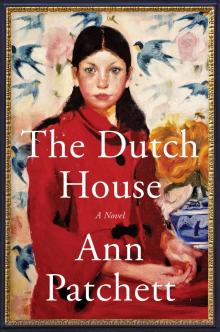 The Dutch House
The Dutch House Bel Canto
Bel Canto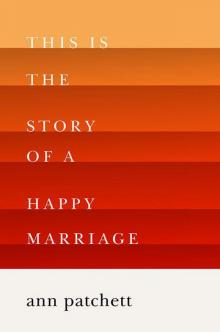 This Is the Story of a Happy Marriage
This Is the Story of a Happy Marriage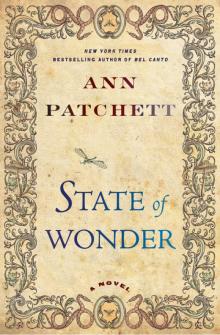 State of Wonder
State of Wonder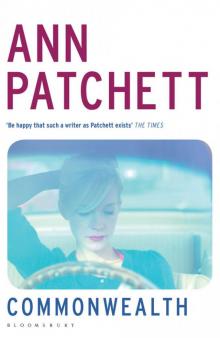 Commonwealth
Commonwealth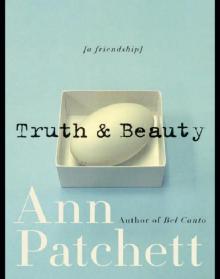 Truth & Beauty: A Friendship
Truth & Beauty: A Friendship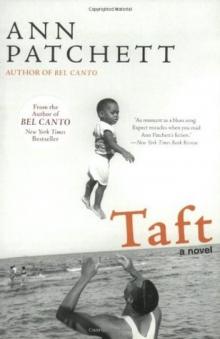 Taft
Taft What Now?
What Now?